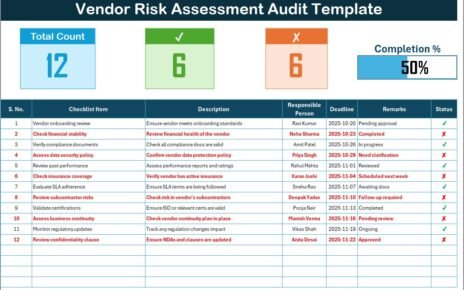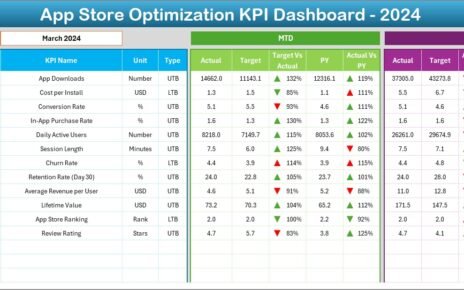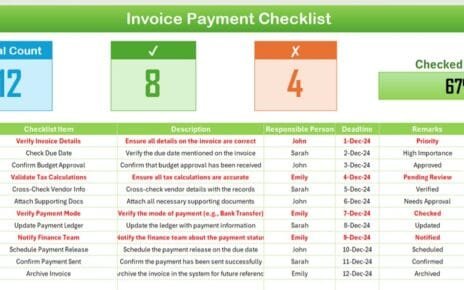In today’s fast-paced regulatory environment, staying compliant with legal standards is more important than ever. Businesses must follow a series of protocols and regulations to avoid penalties, fines, and legal issues. One of the most effective ways to ensure legal compliance is by using a Legal Compliance Evaluation Checklist. When managed through a simple tool like Excel, this checklist becomes a powerful asset for tracking, updating, and ensuring compliance across various departments.
This article will dive deep into how you can leverage a Legal Compliance Evaluation Checklist in Excel to streamline your business operations, stay on top of your legal obligations, and maintain a high level of compliance. We’ll explore its key features, advantages, best practices, and more.
Click to Purchases Legal Compliance Evaluation Checklist in Excel
What is a Legal Compliance Evaluation Checklist?
A Legal Compliance Evaluation Checklist is a tool that businesses use to monitor and ensure compliance with various laws, regulations, and industry standards. This checklist helps organizations maintain a systematic approach to fulfilling their legal obligations by tracking compliance statuses, responsible parties, deadlines, and any remarks or issues. It acts as a record-keeping tool for compliance activities, making it easier to stay organized and ensure no legal requirement is overlooked.
Having a legal compliance checklist in place can drastically reduce the risk of non-compliance, which could result in costly penalties, reputational damage, or even legal action. With Excel, the process of managing and updating compliance tasks becomes much more streamlined, as Excel offers flexibility, ease of use, and powerful organizational features.
Key Features of a Legal Compliance Evaluation Checklist in Excel
The Legal Compliance Evaluation Checklist in Excel template comes with a variety of features that make it an essential tool for businesses. Let’s explore the two main worksheets that are included in the template:
Legal Compliance Evaluation Checklist Sheet Tab
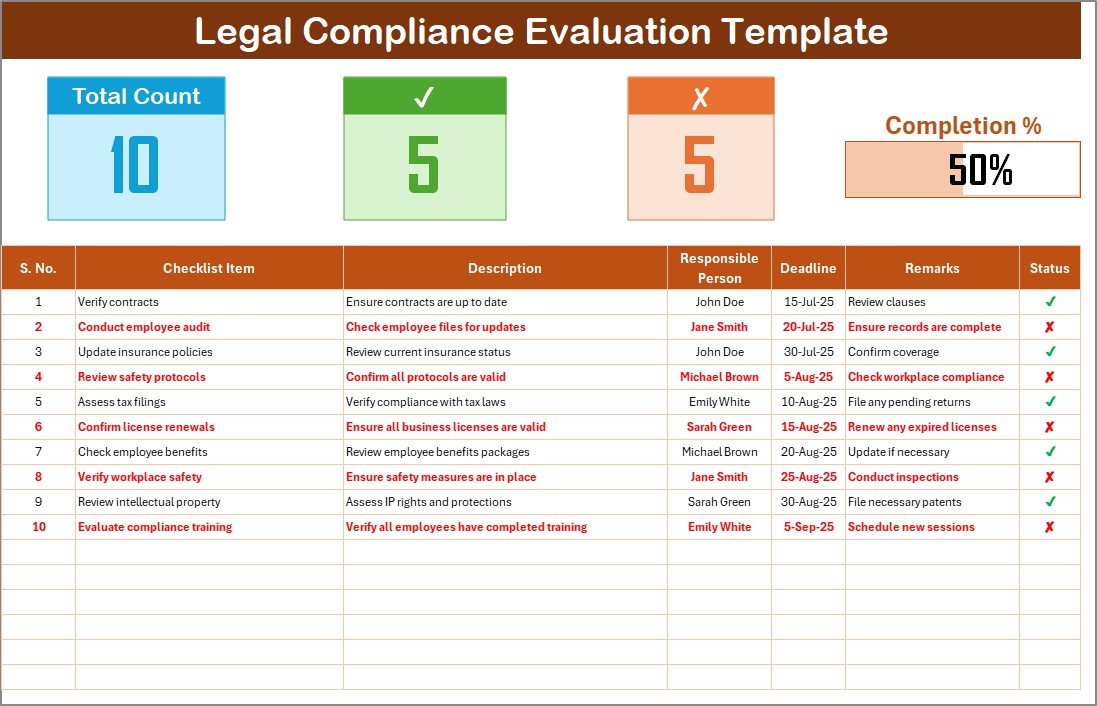
This is the primary sheet of the template where you capture and track the compliance tasks. Here’s what you’ll find:
Top Section:
At the top of the sheet, you’ll find an overview of the compliance status. This includes:
- Total Count of tasks
- Checked Count of completed tasks
- Crossed Count of non-compliant tasks
- A Progress Bar indicating the percentage of tasks that are checked (i.e., compliant)
-
Checklist Table:
Below the top section is the main checklist table. Here, you will: - Track each compliance item in detail
- Update the status as either ✔ (compliant) or ✘ (non-compliant)
- Include columns for:
-
-
-
Serial No.
-
Checklist Item: A brief description of the compliance task
-
Description: More detailed information about the task
-
Responsible Person: The individual or team responsible for ensuring compliance
-
Deadline: The date by which the task should be completed
-
Remarks: Any additional comments or notes related to the task
-
Status: To mark whether the task is compliant (✔) or not (✘)
-
-
-
Click to Purchases Legal Compliance Evaluation Checklist in Excel
List Sheet Tab
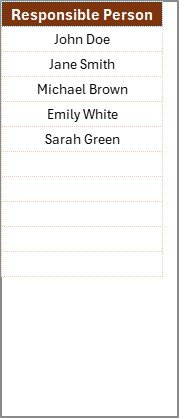
This sheet captures the unique list of Responsible Persons involved in ensuring compliance. By utilizing this sheet, you can easily create a drop-down list in the main checklist table for the “Responsible Person” column. This helps standardize the entry process and prevents manual errors.
Advantages of Using a Legal Compliance Evaluation Checklist
A Legal Compliance Evaluation Checklist in Excel offers several significant advantages that help businesses stay organized and compliant:
1. Organized Tracking of Compliance Tasks
The checklist allows you to keep all legal compliance tasks in one place. Each task is tracked with clear columns for deadlines, responsible parties, and compliance status, ensuring that no requirement is missed.
2. Easy to Update
Excel is an intuitive and user-friendly platform. Whenever there’s an update in legal requirements or changes in deadlines, you can quickly modify the checklist and ensure the information remains current. This flexibility makes it easy to keep your compliance efforts in line with evolving legal standards.
3. Transparency and Accountability
By assigning specific responsible persons to each compliance task, you create a system of accountability. It’s easy to track who is responsible for what and ensure that tasks are completed on time. If any issues arise, the responsible person can be promptly identified, and corrective action can be taken.
4. Visual Progress Tracking
The progress bar and overall task counts offer a visual representation of your compliance status. This helps management and other stakeholders quickly assess where your organization stands in terms of legal compliance and where additional efforts may be needed.
5. Cost-Effective Solution
Using Excel to track compliance is a low-cost alternative to expensive compliance software. It’s accessible, familiar to most users, and offers a range of features that make it an ideal tool for small to medium-sized businesses.
Click to Purchases Legal Compliance Evaluation Checklist in Excel
Best Practices for Legal Compliance Evaluation
To ensure that your Legal Compliance Evaluation Checklist is used effectively, here are some best practices:
1. Set Clear Deadlines
Ensure that each compliance task has a well-defined deadline. This helps to prioritize tasks and prevents missing critical deadlines.
2. Assign Specific Responsible Persons
Make sure each checklist item has a designated responsible person. This reduces ambiguity and increases accountability.
3. Regularly Update the Checklist
Compliance laws and regulations often change. Regularly review and update your checklist to reflect the latest legal requirements and deadlines.
4. Use Color-Coding for Status
While the checklist allows you to use simple ✔/✘ symbols, consider using color-coding for easier visual identification. For example, green for compliant (✔) tasks and red for non-compliant (✘) tasks.
5. Review Compliance Regularly
Set a periodic review schedule for your compliance checklist. Regular audits can help ensure that all tasks are on track and compliance gaps are addressed in a timely manner.
6. Keep It Simple
Don’t overcomplicate the checklist with too much detail. Keep the items simple and straightforward, ensuring that the checklist remains user-friendly and effective.
How to Effectively Use the Legal Compliance Evaluation Checklist in Excel
To effectively use the Legal Compliance Evaluation Checklist, follow these steps:
-
Start with the Legal Requirements: List all legal compliance requirements relevant to your industry and business operations.
-
Break Down Tasks: Break each requirement into smaller tasks or steps to make it easier to track.
-
Assign Responsibilities: Clearly assign each task to a specific individual or team.
-
Set Deadlines: Define a realistic deadline for each task and ensure that deadlines are met.
-
Regularly Monitor Status: Use the checklist to update the status of each task and address any issues promptly.
Conclusion
A Legal Compliance Evaluation Checklist in Excel is a powerful tool that helps businesses stay organized and ensure that all legal requirements are met on time. With features like task tracking, progress bars, and responsible person assignments, this template is designed to streamline your compliance efforts and improve transparency. By following best practices and maintaining an up-to-date checklist, you can protect your business from costly legal issues and penalties.
Frequently Asked Questions (FAQs)
1. What is a Legal Compliance Evaluation Checklist?
A Legal Compliance Evaluation Checklist is a tool used to track and manage legal compliance tasks. It helps businesses ensure they are meeting legal obligations and regulations.
2. How do I create a Legal Compliance Evaluation Checklist in Excel?
You can create a Legal Compliance Evaluation Checklist in Excel by using columns like Serial No., Checklist Item, Responsible Person, Deadline, and Status. The checklist can be customized with additional features like progress bars and drop-down lists.
3. Why is it important to have a Legal Compliance Evaluation Checklist?
A checklist ensures that all legal tasks are tracked, reducing the risk of non-compliance and penalties. It provides transparency and accountability within the organization.
4. Can I update the checklist if legal requirements change?
Yes, Excel makes it easy to update the checklist with new legal requirements, deadlines, and tasks as needed.
5. Is the Legal Compliance Evaluation Checklist free?
Yes, the Legal Compliance Evaluation Checklist in Excel template is free to use, making it a cost-effective solution for businesses of all sizes.
Visit our YouTube channel to learn step-by-step video tutorials

